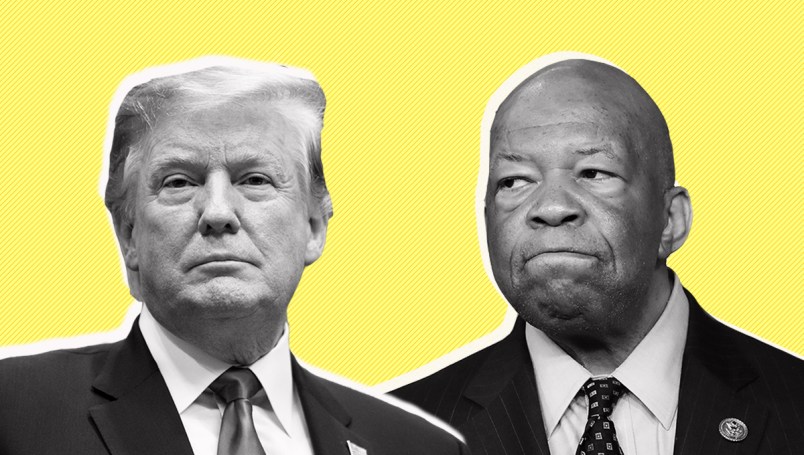A federal judge had tough questions for the lawyers leading the effort by President Trump and his businesses to block a House subpoena of Trump’s accounting firm for his financial records.
At a hearing on Tuesday in D.C., U.S. District Judge Amit Mehta grilled Trump’s lawyer William Consovoy about his arguments that the subpoena exceeded Congress’ constitutional authorities.
At one point, Mehta asked Consovoy if it was his view that Congress’ investigations into Whitewater and Watergate were beyond the scope of their authority.
Consovoy stammered a bit, before telling the judge he would need to look more closely at the bases of those investigations.
Tuesday’s proceeding was the first public hearing in a matter related to the multi-front showdown between President Trump and House Democrats over Congress’ oversight abilities. But it’s likely to be the first of many.
In this case, private attorneys working on behalf of Trump and his business sued to stop their accounting firm from complying with a House subpoena for business records. The House Democrats have intervened to defend their subpoena. The accounting firm, Mazars has not taken a position in the matter.
Judge Mehta indicated at Tuesday’s hearing that he would decide matter quickly based on what had already been argued. It is almost guaranteed, however, that whatever his decision is, it will be appealed to a higher court.
Trump has claimed in legal filings that the subpoena should be blocked because it serves “no legitimate legislative purpose.” House Democrats argued that Trump is misconstruing their investigative authorities. Outside legal scholars have mostly sided with Democrats in their analysis of the case so far.
Trump and his family brought a similar lawsuit in New York against their banks Deutsche Bank and Capital One.
On Tuesday, Consovoy argued that Congress was inappropriately seeking to take on the role of law enforcement in its investigation to Trump.
“They have made clear this is not about legislation,” he said.
Mehta asked Consovoy if he was asking the judge to look beyond what facially acceptable reasons for Congress’ investigations are and to get to their motives, which the judge was “expressly prohibited” from getting to. Consovoy claimed he was not asking the court to look for “secret motives.”
“We think that when you look at those letters in the full context,” Consovoy said, referring to the letters that the committee sent regarding the document requests, “this is law enforcement.”
The judge, however, seemed wary of the argument that Congress could only investigate matters it could specifically tie to legislation. He asked Consovoy whether Congress “has a function of informing itself and informing the public” of wrongdoing, such as corruption.
Judge Mehta also grilled Consovoy on the relevant case law and asked the lawyer specifically whether there was a case more recent than one decided in 1880 that found a congressional subpoena overstepped its authority.
After some quibbling, Consovoy went on to concede that the 1880 case, Kilbourn v. Thompson, was the most recent one dealing with that particular issue but he stressed that the case was “good law” and relevant to the Trump lawsuit.
When it was the House’s turn in front of the judge, Mehta asked their lawyer Doug Letter about the lack of an official statement or resolution defining their accusations.
“It really does, open the door, it seems to me to the accusations… valid or not,” that this was about an effort to get into the President’s private affairs for political reasons, the judge said.
The judge also asked Letter if there were any limits, under his theory of Congress’ investigative theory, to what the committee can investigate about the president’s private life.
Letter said he could think of some hypotheticals — like a subpoena for a president’s diary from when he was seven years old — that would stretch his legal arguments, but “fortunately, for the House, they are nowhere even close to that.”
Letter argued that it was within Congress’ interest to investigate whether the President broke any laws, and stressed that didn’t mean Congress was trying to prosecute the President.
He put forth the hypothetical that a president, before taking office, may have committed bank fraud by lying on a loan application, and that he might now be “beholden” to a bank or foreign government that knows he broke the law.
Mehta last week indicated that he planned to consolidate some of the procedural steps in the case — putting it on a fast track for resolution. Trump’s lawyers objected to the move on Monday, in a filing that asked that the judge either postpone Tuesday’s hearing or reverse his decision to consolidate the matters that he planned to hear on Tuesday. House Democrats opposed Trump’s request.
Mehta declined to cancel Tuesday’s hearing but said on Monday he’d hear Trump’s objections to the consolidation move.
At the beginning of the hearing he made clear that he was not going to rule from the bench on Tuesday. However, he also quizzed Consovoy about what more Trump’s legal team needed to do to complete the record so that the judge could make a ruling on the merits of the case. The judge ultimately denied Consovoy’s request for additional briefing in the case, and instead said he would keep the record open until May 18 for any additional information that the parties wanted to submit.
“We’re not going to drag this out,” the judge said.






